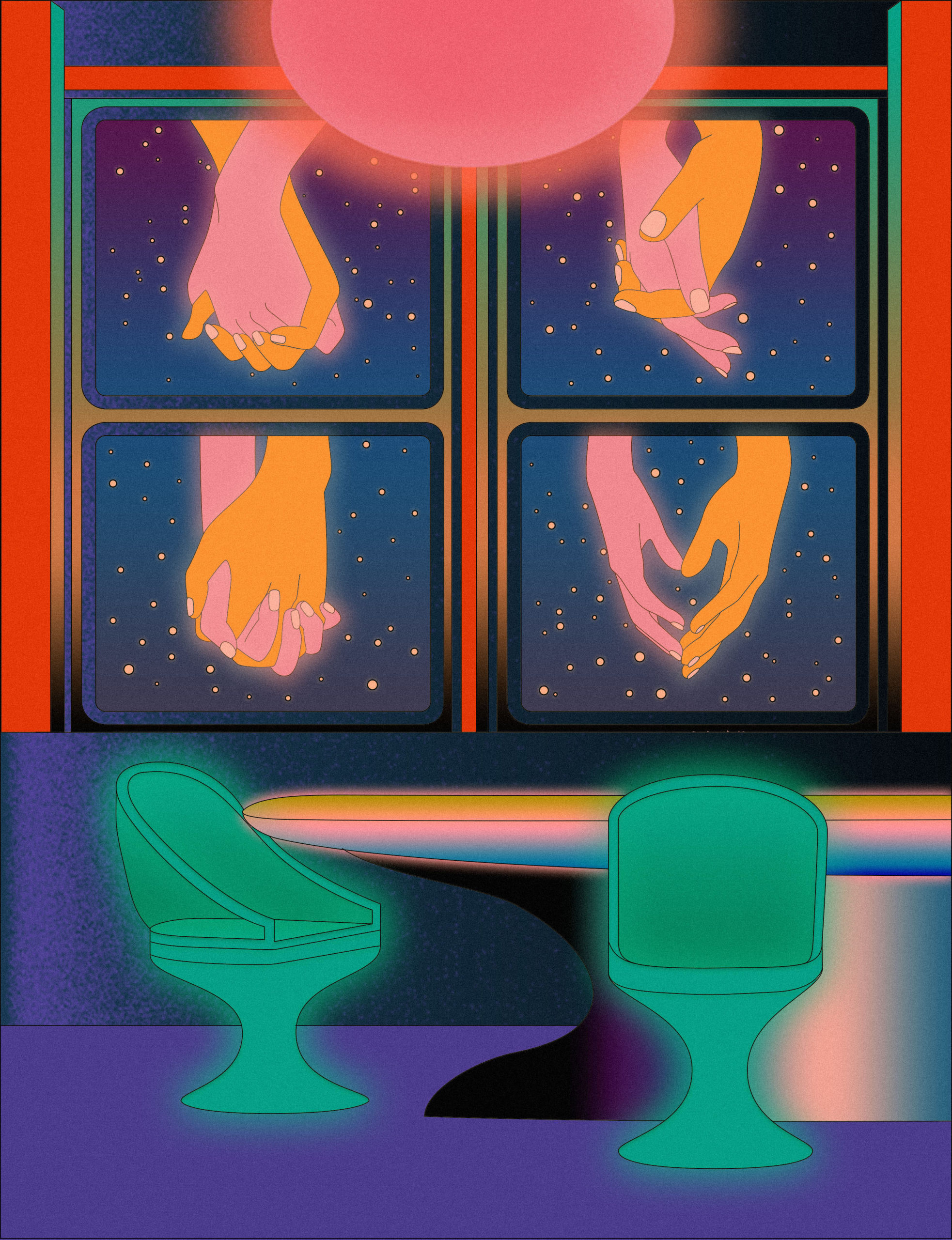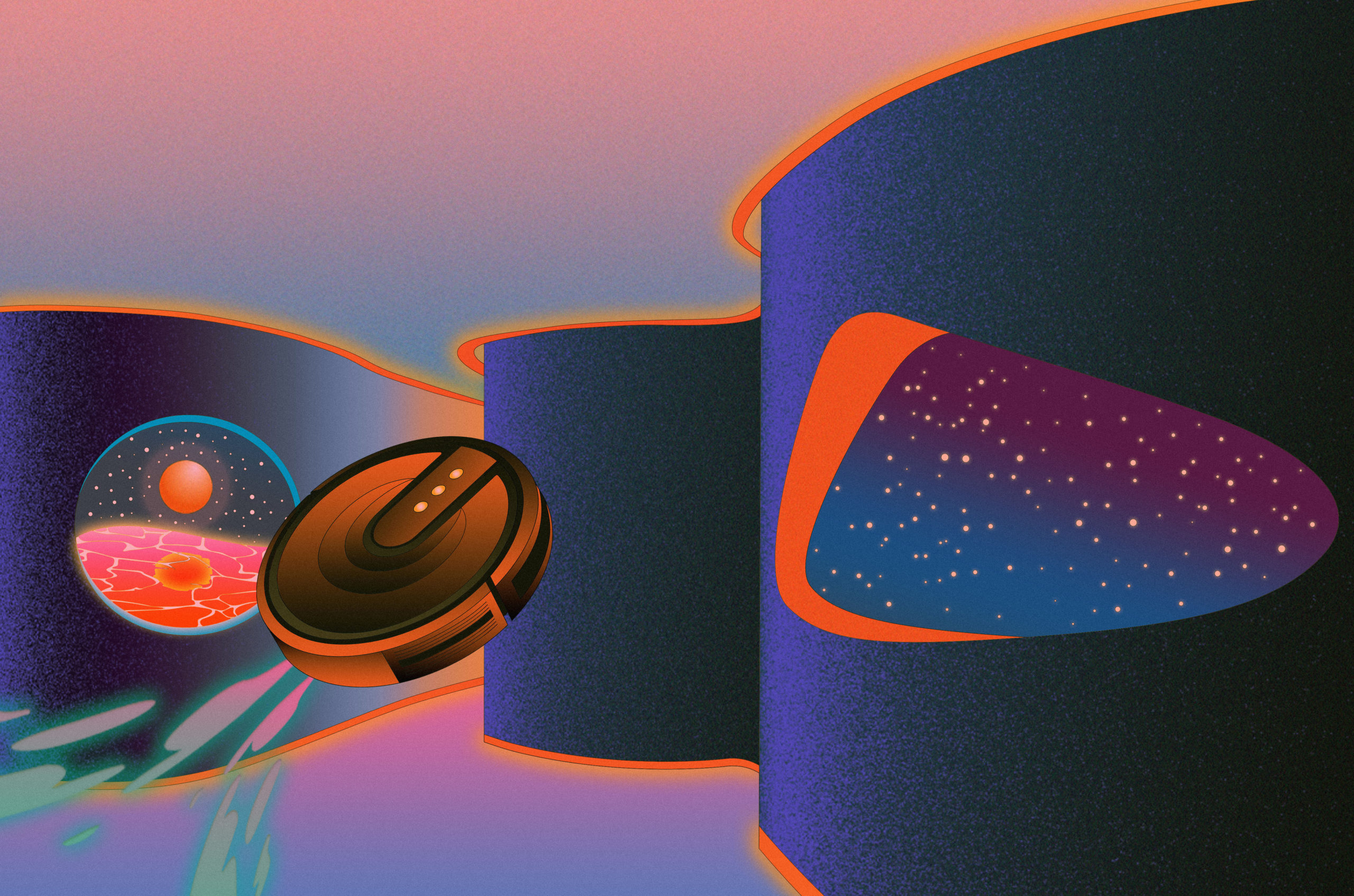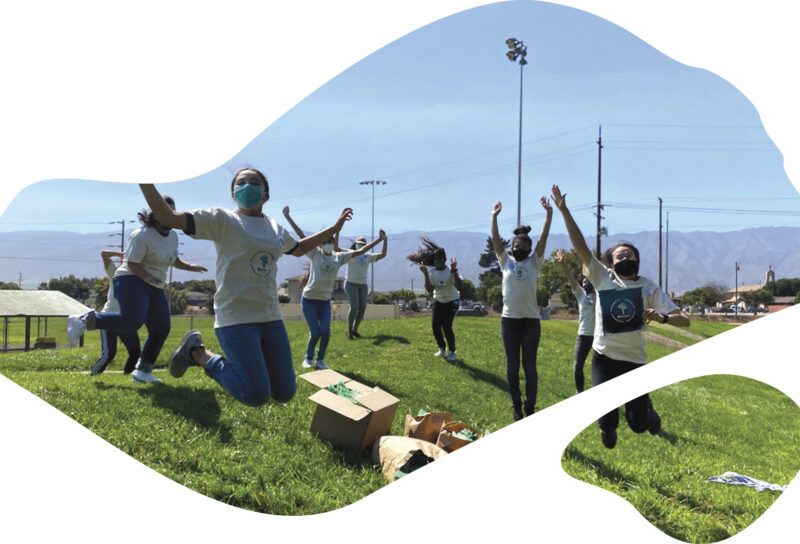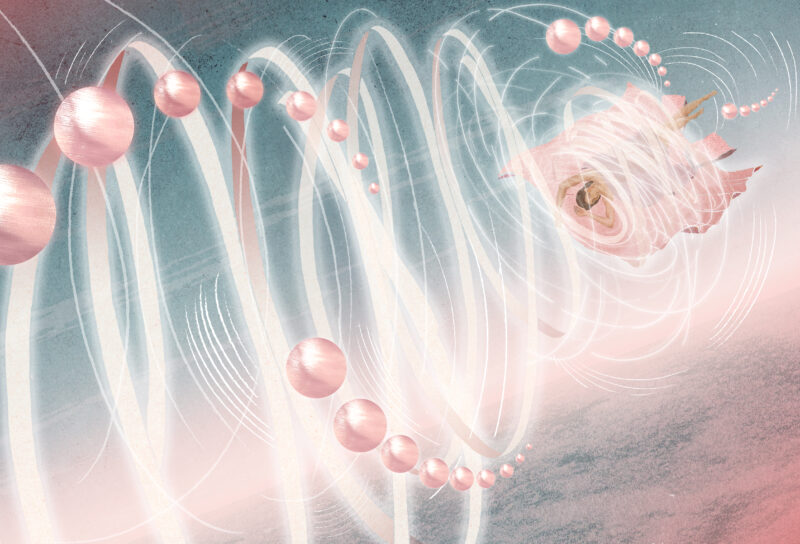in space, everything is architecture. There is no nature — just dust, dead matter, molecules, the void. On Earth, the ingredients for survival are readily available. Water, oxygen, green stuff. But in space, you can only live if you build something, and there’s nothing around you except what you build. Just building. The building itself and the act of constantly building it.
We spend a lot of time building, fixing, and cleaning our architecture in space. The things that keeps us alive. We have robots to do a lot of the work, but then those robots need robots to maintain them, and so do those robots, and somewhere at the end of the line there’s always a person, probably squatting on the floor, rubbing a piece of a machine with a dirty cloth. An ancient image: the human squatting with a towel and a spray bottle.
In space, everything is maintenance. When basic survival can be threatened by a dirty gasket or a puncture in a thin membrane of plastic, everyone is going to spend more time keeping things nice and clean. It’s not worth the risk. Too much garbage threatens the whole ship. Garbage is the great leveler in space.
That’s what I told Tina a few hours after she got here. I told her that visitors in space are not like guests on Earth: We were happy to have her and wanted her to have a nice time aboard — there would be celebratory sangria from little pouches later — but she was going to have to handle her own mess from start to finish.
Tina laughed and told me not to worry — she wasn’t a mixed-media artist. She held up her video camera and waggled it. “Doesn’t drip,” she said.
“Is that thing on?”
She brought the lens up close to my face. “Dunno, is it?” She flicked a finger, zoomed in and out.
“No filming until sangria,” I said, covering the glass bubble with my hand, like a celebrity shoving off a paparazzo.
She let out an exaggerated sigh. “Digital, Bea, dig-i-tal.”
But I decided to keep saying film. It sounded grand. And I was so tired of digital crap.
Tina was our first artist-in-residence. We’d all read up on her when she was picked, or, should I say, we’d done an image search. It had been three years with no “fresh meat,” to borrow one of Jared’s eternal catch-phrases. The first time he’d made a joke about needing some fresh meat we thought it was funny, but then it slid into creepy, and now it had trickled into sad.
The meat we eat here is quite fresh, in a way — it’s grown in the Vat Zone on Deck 4. Nobody has to be slaughtered for us to eat it, which makes us feel humane. We’re supposed to feel like we’re part of a solution, not contributing to a problem. I think that’s part of why they started the artist-in-residence program, to make us feel like we’re contributing to a higher cause. To try to elevate this dumb endeavor by adding some high culture to our drab, debased lives. Our CEO must have realized that the public down on Earth needed proof that this was more than a publicity stunt.
We salivated in anticipation of Tina’s arrival. By Anno 3, we were so used to the finite quantity of our 17 selves, so familiar with each other’s bodies, that we had become grayscale to one another, colorless and tasteless; we might as well have been grown in vats.
It turned out that I had dibs on this new x-factor. I discovered a line buried in my job description that said I was responsible for instilling a positive Corporate Culture, which was as close to a claim on the artist-in-space-residence as anyone could get.
“Corporate culture?” Evelyn asked. “Doesn’t that mean you should have been planning movie nights or something this whole time?” But everyone eventually agreed that I could be the one to greet the artist, our temporary number 18.
“Remember, head start doesn’t mean slam dunk,” said Evelyn, pretending to dribble a basketball.
“Let the Space Race begin,” said Jared, for the hundredth time.
Miraculously, here she was. The airlock opened and she peered out from inside the little drone capsule that had delivered her from the crust of the Earth onto our doorstep.
She squinted at me, turned her head to the side, then barfed.
After a robot had vacuumed up the bile and she had changed into fresh space overalls from the Spring/Summer collection, Tina asked me who I was. She was holding onto a ceiling hook so that we were floating eye-to-eye. I saw a glistening smear of green in her black hair. “Beverly, right?”
“Beatrice,” I corrected her, pretending to be stern. “Pleased to meet you. I’m the commander.” I put my hands on my hips, which caused me to jostle against the wall and start to rotate until I was watching her sideways. “Just kidding. We don’t have a commander in space. This isn’t Star Trek. It’s not some kind of movie.”
Tina smiled a little and pointed to her camera case, which was fastened to her hip. That was the first time I noticed her hip. Her catastrophically sloping curve of a hip.
The truth is that I was quivering with nervousness, even before I saw her or her hip. Imagine three years with your colleagues, imagine time’s evaporation, imagine a place where nothing can spark. It wasn’t until I said the commander thing that I realized my sense of humor had deteriorated into a tattered cloth of repeated phrases, not much better than Jared’s. How thinly tied I had become to Life — the kind that includes all of humanity and not just 17 pieces of meat.
I decided to drop the funny act and just try to seem nice. I didn’t want my desperation to scare her off. This was a conundrum that would plague me until the end: I could only avoid depressing her by lying. I smiled in a way I hoped didn’t seem fake, and gestured toward the layout diagram of the ship, the same one that was plastered on a wall of every deck, and pointed to where we were. I didn’t really need to point. There was a little green dot giving this information.
“I saw it in training, don’t worry,” Tina said. She took a long look at me instead. “Sorry I didn’t remember your name at first. I’m kind of face-blind.” She fumbled her grasp on the wall grip and bumped into me lightly. Beneath the scent of her freshly 3D-printed overalls I caught the scent of a completely new kind of creature. Pheromones! In space!
We may not have a Commander but we do have a Mission. It’s inscribed in a mission statement on our website, just like any company on Earth. The statement says our mission is to thrive up here, as proof-of-concept. The concept is that people can work well anywhere. As a bonus, here our bodies are also contributing to science. We’re all doing a science experiment every day. For the experiment to succeed we have to not die for as long as possible, while constantly measuring our health and productivity.
Mainly we’re a tech company. We release products every year and we disclose quarterly profit/loss statements to our shareholders. Our big thing is satellite internet. We provide the fastest internet in the galaxy. In space, my home is one gigantic, orbiting satellite, relaying information back and forth to people on Earth at breakneck speed. It seems that people are willing to pay an incredible amount to avoid buffering.
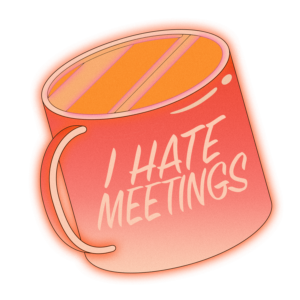
As a company we’re nothing special. But we’re doing it from space, which is historic. The historic element has a net positive effect on our share price. It doesn’t matter that only the 17 of us are here, and that the CEO and the rest of the team on Earth do most of the work. They couldn’t send everyone up, anyway. Who would take over if our architecture fails? Nobody would buy stock in a company whose whole staff could be wiped out in an instant by a space rock.
Mike, my manager, is from Southern California and really suffers from the lack of sunlight. We joke about this a lot, because technically we’re closer to the sun now. We get way more radiation, but nobody is getting a tan. The lack of nature bothers Mike more than me.
Mike isn’t the type of person who saw himself ending up in an office job. He only took this job because it was in space, which he thought would be exciting. In the age of remote work, why not work as REMOTELY AS POSSIBLE! He read the slogans and thought huh, cool, yeah, why not. In his interview tapes he uses the word legacy a lot. But now he realizes that this is way worse than a normal office job, because there is nothing but office or job. In space, everything is office and everything is job.
The other thing that bothers Mike is that our architecture’s aesthetic is not sci-fi enough. He says we’re living in a cross between a B-movie set and a Dilbert comic strip. “We’re going to spend the rest of our lives in space, Beatrice. Why the fuck do we have swivel chairs and Bic pens up here?” In Anno 2 I watched him feed a pair of i hate meetings mugs into the incinerator.
Tina barfed again on the second day and the third, but by the fourth she was eating vat meat with as much enthusiasm as anyone can conjure for that stuff, and bobbing around every Deck and Zone.
Her camera was always turned on, and since I was her guide — until someone said stop? — it was usually turned on me.
“Will you be my protagonist?” she asked me, hovering over my shoulder as I typed numbers into an Excel sheet, finishing my first coffee of the rotation. I hadn’t noticed she was so close, and I hunched over my screen protectively. I’d been keying random amounts into the document.
I exed out of the program and swiveled around on the floor-bolted chair I was strapped into. “Depends on the story.”
“Character drives story,” she shrugged. “It all starts with you.”
I noticed, again, how much better the space overalls looked on her than they looked on the rest of us. I’d liked the Fall/Winter suit more, but each season we had to dissolve the retro garments into slurry so the 3D printer could fabricate our new looks. We sent JPGs of ourselves posing in each new pair down to Mission Control as part of the branding deal. It was, we joked, the only access we had to the concept of changing seasons.
“I’m not a character,” I said, “I’m Beatrice. A person.”
She laughed in a way that made me feel like I was actually a person.
“Ok,” I said, blushing. “What do you need to make your movie? What is your art going to be about?”
I had of course watched some of her videos already. Hand-held footage of friends, parties, museums, lovers, bedrooms — all strung together and given something like a storyline by her gentle, confident voiceover. The Times had called her “a master of intimate portraiture.”
“Just you,” she said. “What you do up here. What you did back there. Your wants, your desires.” I frowned. I could feel my armpits getting slick with sweat. “Come on,” she said. “There must be so much going on in your mind. You’re in space, for god’s sake.”
I knew what she was getting at. Being in space is supposed to raise the stakes, heighten the drama.
Every character in a story needs to want something, even a glass of water. But at that moment the only thing I was sure I wanted — had wanted in three years — was to simply maneuver my hand onto her hip and run it down the seam of the fabric.
“If you want to find out whether I’m here for the Right Reasons,” I said, looking down, “you’re not going to get very far.”
“Let’s start small. Tell me about what you do every day, on this satellite orbiting Earth.”
“We call it a spaceship,” I said, childishly. It was not a spaceship.
“My bad.”
“And we don’t really have days here.”
She nodded. “Fair enough.” She hoisted the camera to my eye level.
I turned to peer into the camera. “My name is Chief Technical Assistant,” I said to the machine. “Also known as Beatrice. And my job is to make sure our company’s records and archives and databanks are well-stocked and well-organized.” The lens was swiveled at me in an unflattering angle. I tilted my chin down. “I check the logs and the sheets several times each rotation, just to make sure there are enough — numbers in there.”
I didn’t want to say to Tina, much less her eventual audience on Earth, that most of that information is garbage. We never use the numbers for anything. The only reason I have to keep it all piled together is for insurance purposes, in case something goes wrong. In case the architecture breaks and someone has to pay for it. In case a tiny space rock hits the window and somebody gets sucked out of the hole. Not that we have many windows.
“What do all these numbers show?”
“Oxy and carbo levels. The temps of the vats. Pressure ratios. What have you.”
“And you just keep it here.” She pointed at my screen, which was framed in fancy paneling but was really just an iPad.
“You know what’s funny,” I told her, “is that all the information we collect is actually stored on Earth. We send it down there about 10,000 times a day using our super-fast internet, because it’s safer there, in the servers under the ocean where it’s nice and cool.” I paused and pointed downward, as if down meant down. “Cozy data. Chill data.”
Of course, the data would be plenty cold if we kept it up here, but it would not be completely safe. The same space rock that could hit a window and kill a person could also hit a server and kill the data needed to prove that it wasn’t the CEO’s fault that the space rock hit the window and killed the person. So we’d be paying for a new server and a new person and a whole lot more. The CFO would not like that.
“I feel like I’m not really giving you a lot of interesting material,” I said. “I should probably get back to work.”
When she left, I went to our company website and read that the job of the artist-in-residence is to authentically express the experience of living in space by getting to know us in an intimate way. Her task, it said, was to communicate to the public the incredible complexity of our venture and to offer “speculative and critical perspectives on what offworlding means for the future of the human species.”
Tina was only staying for 12 weeks. Her return ticket created a gulf between us that made the possibility of feeling an authentic connection seem hopeless, or worse, like a farce. Like she was here to extract something from us — from me. The trouble was that I wanted to give her anything she wanted.
One aspect of our jobs is better here than it would be on the ground. The gossip. You have no idea how much gossip happens in space.
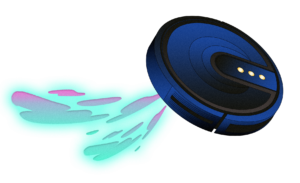
Not long before Tina’s arrival, Maggie had cheated on Jeff with Evelyn, and this required a conflict resolution. Conflict resolution is kind of like cleaning up your garbage. We need the conflict as much as we need to eventually resolve it. Without those middling plotlines and intrigues, what would be our glass of water?
On Earth, I might not be so openly curious about things like the conflict resolution happening on Deck 7. And on Earth everyone else might have paid less attention to, say, my obvious lust for our visiting artist. We would have all had separate lives. But here, our diarrhea sometimes escapes the little bags we aim to shit in, our sneezes hover in viral clouds until some bot comes to hoover the particles up. We’ve lost shyness, we’ve lost privacy, we’ve lost the shame of the body.
For my first couple months here, I lived in a constant state of disgust. Then, I crossed a threshold where nothing seemed gross anymore. People tell me that’s what it’s like when you have children. Poop, pee, drool, none of it bothers you. Even if you are to some degree repulsed by your own shit, somehow your kid’s shit is totally fine. Or even lovely. I remember, one day before I left, watching my best friend Matilda smile sweetly while wiping green sludge from her naked infant’s buttcrack.
During our second recording session, which was easier than the first, I told Tina all about Matilda. “I miss Matilda’s kid as much as I miss her,” I explained. “But it’s weird to miss someone who wasn’t really a person yet when I left.” I admitted that I can’t stand to video chat with them anymore — watching Matilda’s kid become more and more a person, while I become less and less of one.
I expected Tina to ask me the question everyone has asked me eventually since my name appeared in the news three years ago. Nobody likes the idea of a fertile woman going to space, where there is no nature. Nobody likes it, not your friends, not your parents, not your president.
But getting my tubes tied never gave me any anxiety. The Earth is dying; I’m not one to avoid the facts. I didn’t need to tell Matilda that her kid is going to have a rough time of it. She knows this and it pains her to no end. I did not want the pain that comes from knowing the future. I wanted to escape from the future entirely, my own and everyone’s. In space, everything is past.
“Intergenerational life is not what this experiment is about,” I said to Tina, trying to pre-empt her questions. “I’m sure there will be one, down the line, a new start-up whose mission is to start-up a new generation of office workers in space….”
But Tina didn’t push it, and I was grateful. I knew by then that my mistake was not infertilizing myself, which I would have done anyway. My mistake was space.
By the time Tina got here, everyone had started sleeping a lot. Not normal sleep, more like hibernation, deep and sudden. Mike said it was like being zapped in the forehead right where your third eye would be. To me, it felt more like a warm fur was creeping up and smothering me until I had no choice but to get horizontal.
In space, horizontal is a state of mind. The important thing was to get properly zipped into our sleep sacks before the exhaustion hit. Evelyn and I had to help Mike once, when he’d conked out with his overalls only partially un-velcroed and his hair tangled in the zipper of his sack.
Perhaps the fatigue is just another side effect of living in low-G, in addition to bone density diminishing, eyeballs elongating. Our bodies are changing noticeably, even when we try to skew the data in our favor. But the sleep is not a typical side effect. It’s more likely that our cumulative regret has taken narcotic form.
I didn’t really understand regret before I got here. How could you qualitatively evaluate the past? But now I get it. Regret isn’t about wishing you’d done something differently, even if you understand it was a mistake. It’s the knowledge that time is linear after all. It’s like claustrophobia, something your body does in a tight space. It’s like grief.
Lots of people sent in application tapes. Thousands. For this once-in-a-lifetime opportunity. But an irreversible decision is not an opportunity, it’s the opposite.
“I’m rich, by the way,” I told Tina. We had covered a lot of ground in our sessions by her second month and I was starting to forget to filter my chatter. “I got a lot of shares for coming up here and the stock just vested.”
“I love that word, vested,” she said. “Money puts on a little vest and suddenly it’s real.”
I had also been thinking about my money wearing a vest, and I told her this. I also told her that there is nothing to spend the money on in space, which raises the question of what rich means on an existential level.
“Obviously, I’m going to give it away,” I added hurriedly. “Charities,” I said. “For environment. Like, environmentalism.”
“You didn’t come up here for the money, is what you’re saying?”
I shook my head. It was true that, besides Mike, the rest of the crew had signed their contracts for this reason: to obliterate overdraft fees, student loans, mortgages. Generations worth of debt, wiped clean; future generations solidly provided for. We’d be here, but at least our descendants and beneficiaries would be marching into the future, wearing little vests of wealth. Money was the easiest explanation. But not for me. I had been a classic double-income-no-kids DINK, a software engineer with a healthy salary, an ovaried woman with a 401K.
Tina was looking at me expectantly. I could tell she was circling tighter and tighter around my reasons, like a bird circling a carcass. I gave her the look that meant I was getting back to work.
I asked Tina why she wasn’t filming the others. It had been six weeks and here she was, still orbiting almost exclusively around me. Mike, for instance, has what some would call a beach bod and a TV-friendly face. When he learned she was a video artist, he was hopeful that we might finally get reality TV cameras up here, blasting our existences 24/7. He feels let down that there’s nobody to witness him in the daily business of legacy-building.
“You could spend some time on Mike,” I encouraged Tina, partly just because I thought he might let up on the incessant teasing if she paid him some attention. Bea’s gottacruuuush.
“No. You’re my protagonist,” she whispered. We were looking out of a porthole on Deck 5. Stars, just pinpricks in the dark fabric of the universe, nothing special. “The rest of the people on this spaceship are basically Jims and Pams from The Office.”
I sighed. Yes, I knew this. We even had two literal Jims. I pressed my nose up close to the little window, convex like a camera lens, and told Tina that I had always secretly wondered if these portholes were actually screens.
“We wouldn’t know, would we?” I jabbed at the window. None of us had license to roam around outside in spacesuits, umbilically tethered to the architecture by a thin cord, so it’s not like we had empirical proof that there was an outside. “We get all the info we need from graphs and charts on screens — the windows tell us nothing, except that we’re in space. Even Earth looks like it could be CGI.”
“It does look like CGI,” Tina nodded, gazing up at the sliver of Earth you could see at the edge of the frame. I was relieved to hear it; my eyesight had gotten so much worse lately. I’d been wondering whether the effect was a symptom of my eyeballs’ elongation. They blooped out from my face in a way they hadn’t before.
“Maybe we’re still down there, and this is like that Japanese game show where a guy is trapped in a room for days and then suddenly all the walls fall down and he finds out that the room is a stage, and the audience is clapping and laughing at him…”
Tina put her hand between my shoulder blades, near the spine, and lowered her camera, which I had forgotten was on. “I don’t think this is a Japanese gameshow,” she said. She ran her hand down my back, feeling my vertebrae beneath the fashionable, uncomfortable overalls.
“Maybe it’s like that show about hoarders. Where they’re trapped in their house until they get it perfectly clean.”
“I don’t think it’s like that show about hoarders.” Her face came closer to mine, her two top teeth gleaming just beneath the top lip. The lips were outlined in pink. Tina was wearing makeup, I realized with a shock that made me feel instantly self-conscious. Nobody had worn makeup on this gameshow since liftoff.
“Is it like Love Island?” I said, just before the skin of my lips was touching hers. Like a lizard, I reached out briefly with my tongue to taste her bottom lip.
We laughed into each other’s mouths.
I was on vat-duty rotation. Tina came with me to see the nitty gritty for herself. Jim 1 and Jared, who were huge fans of the slime mold, were in the Vat Zone when we came in. They were trying to guess where the little spores would spread next. When they saw us, they snickered. A mixture of jealousy, heteronormativity, and respect.
“Looks like you’ve been getting some good in-spy-ration up here,” said Jared, smacking his lips and wiggling his eyebrows at Tina, then jabbing me with his elbow.
“Aw, leave ‘em alone, buddy,” said Jim 1. “They just amigas.”
“A-meee-gus!” Jared made a gesture of snapping his overalls.
“When are we gonna find out what yer makin?” asked Jim 1, nodding to Tina’s camera.
He was doing a weird approximation of a southern drawl. “When did you start talking like that?” I asked him.
“He’s been watching True Detective all week,” said Jared. He glared at me. “Everyone’s been watching it.”
It was true, I hadn’t been binging episodes in the Rec Zone with everyone else lately, and I felt a twinge of guilt. I really should have shared Tina. It was unfair, our communal scarcity and my sudden abundance. But Tina didn’t want to be shared, did she?
Jim 1 dropped his accent and made a conciliatory comment about how we needed all the creative talent we could get on this spaceship. It wasn’t until the two of them had toddled off that I realized Tina hadn’t said a word during the exchange. When I turned to her to apologize, she was looking at me with grave sadness.
I showed her the vats. She watched me stir the algae, our vegetable, and poke the protein, our meat.
Then I showed her the slime mold vat, which was really more like a little obstacle course. The single-celled organism multiplied and worked its way through the maze, until it reached the other side, where its own food lay: a few grains of oatmeal. Each time it completed a maze we let it shrink back into dormant spores and rearranged its pathways.
The slime mold was mostly up here for fun — it was the closest thing we had to a pet. It was also sort of our mascot. The slime’s incredible problem-solving ability was what had inspired the CEO to invent the fastest internet in the universe.
We peered into the vats and I wondered — not for the first time, but for the first time with a sense of urgency — about the inevitable artwork that would be borne of Tina’s time in space. “Are you a good artist?”
I could tell she didn’t like the question. I detected a note of embarrassment and it excited me. So far, I had found her to be so brazenly curious about everything outside herself that I had assumed she would be inclined to treat her own flaws and peculiarities as curiosities as well, rather than become self-conscious. But here, I’d sniffed out a sliver of insecurity. And what is intimacy without that soft sliver of vulnerable flesh? Can there be real intimacy without even just the slightest hint of humiliation?
Instead of answering, she told me what she had written on her residency application. “I said that I wanted to continue the tradition of the great landscape painters, who followed the colonial explorers into uncharted territory and documented the New World. I said my work would be a critique of the imperial, colonial legacy of exploration that now extends to the tech-world startup in space.”
“Excuse me?”
She laughed, cackled. “I know, it would never fly if I were white.”
“No, I mean, why does a tech company want you up here calling them colonists?”
She rolled her eyes. “Why does a tech company want you wearing knockoff designer overalls?”
“To advertise the fashion brand?”
She rolled her eyes again. “They want to make it seem like you’re these complicated heroes charting unknown territory. But they know there’s only so long they can glorify this — this.” She waved one arm around, gesturing toward the various parts of the Vat Zone. “They need the overalls, and the fancy website, and the artist, to decorate things, to distract from the psychotic, pointless mission.”
“You told them you were going to critique it.”
“Yeah, I’m here to critique the whole thing so they can say they’re aware of the huge flaws, and then not actually change anything.”
“You have to criticize them so they can keep doing what they’re doing?”
“That’s what artists are paid to do. When we’re lucky, sometimes we get to sneak by and do just a little bit more.” She sighed. “They never notice one way or the other.”
I started to ask another question, but instead of letting me, she took the stirring paddle from my hand, with which I had been absently slapping the meat in its square pen. In space, I thought absentmindedly, everything is vat…
“Stop spanking it,” she said.
“Where’s your camera?” I asked, suddenly realizing something was missing, or someone, the continuous third party in our interactions.
She gave me a brilliant smile and then raised the paddle in the air. She slowly swung it out behind me and then smacked my ass as hard as low-G allows. The force of the smack sent her flying in the opposite direction. She had to monkey-bar her way back for a second spank.
We were traveling at a speed of 5.2 miles per second. By the time we finished and left the Vat Zone, we had nearly completed a full orbit around Earth.
“I figured it out,” she told me. Her last day. She was due to leave in 21 hours. There’s nothing like the countdown of your remaining hours with a lover to intensify the experience of being in a body, to exhume the last latent vibrations of aliveness from the depths of the pelvis or wherever they typically hide, until the whole self is practically shaking with LIFE. The sleeping spell had lifted and unveiled me for who I was: a raw, quivering shrimp.
“Figured what?” I asked. We were holding hands across our sleep sacks. Vee had poked her head in once, to say a preliminary goodbye, but most people had tacitly agreed to give us these hours alone.
“Why you’re here, stupid.”
“There’s never one single reason,” I said, again.
“I get it, though,” she said, almost insistently. “A broken heart is a real thing. The heart seizes up and some people have cardiac arrests and literally die.”
She was right, of course. The person I loved had died. Broken heart, I’d had that. Broken heart, broken planet, time to go.
“I didn’t die, though,” I said.
“You did the next best thing.”
“Sounds about right,” I said. In space, everything is next best thing.
“You know that movie with Jennifer Lawrence? Where Chris Pratt wakes her up from her sleeping pod on their 60-year journey to another planet and she has to choose whether she wants to go back to sleep and reach the planet or live her whole life alone in the spaceship with him?”
I hadn’t seen the movie. “They can’t both go back to sleep?”
“No, one of the pods is broken.”
“Oh.”
“It’s a tough choice for Jennifer.”
“Is it, though? Chris Pratt?”
“True. It’s a tough choice for her character in the movie.”
I shrugged.
“So, in the end, Jennifer falls in love with Chris, even though he ruined her life by waking her up, and she decides to stay awake with him and their robot butler until they die. They die before they reach the new planet.”
Right then one of the bots that regularly cleans the Sleep Zone whirred into action, a cute little floating Roomba, and we both burst out laughing so hard the back of my head started to ache.
Tina did not need to tell me the story about Jennifer and Chris for me to understand that she was not going to stay in space with me and the cast and crew of The Office. She didn’t apologize, and I didn’t ask her to. Foregoing the Planet Earth is not a choice you make out of love. It’s some Gaia shit. Life abhors a vacuum.
Instead I said, “you’re so much hotter than Jennifer Lawrence,” and the painful force of this truth was finally enough to push my failing eyes to do their one true job: manufacture saltwater droplets, which slowly globbed together, escaping sideways from my face.
Foregoing the Planet Earth — but never leaving its orbit. Fuck, I thought. If only we were on our way to another planet like Jennifer and Chris.
All of us crowded around a monitor to watch the video. Me and my 16 life companions. Mike had asked me if I wanted to watch it alone, but I told him I’d rather have company. Our next artist-in-residence was going to be announced live after the premier of Tina’s piece, so we decided to watch the broadcast along with everyone on Pacific Time.
It was only seven minutes long, and mostly it was footage of me. But just my hands. My hands, typing things, pointing at things, and once, holding Tina’s. Instead of her signature voiceover, the only soundtrack was my own voice. A series of declarative statements had been edited into a staccato rhythm, and by the end of the movie, my voice made an infinite loop. In space, everything is — I said, again and again. Ad nauseam. Everything is — in space, everything is. In space, everything — everything is — everything. Everything — in space. Is. In space. Everything is — in space everything is — Everything is — everything — everything. In space. Everything is. For the whole seven minutes, she never let me finish the sentence.
